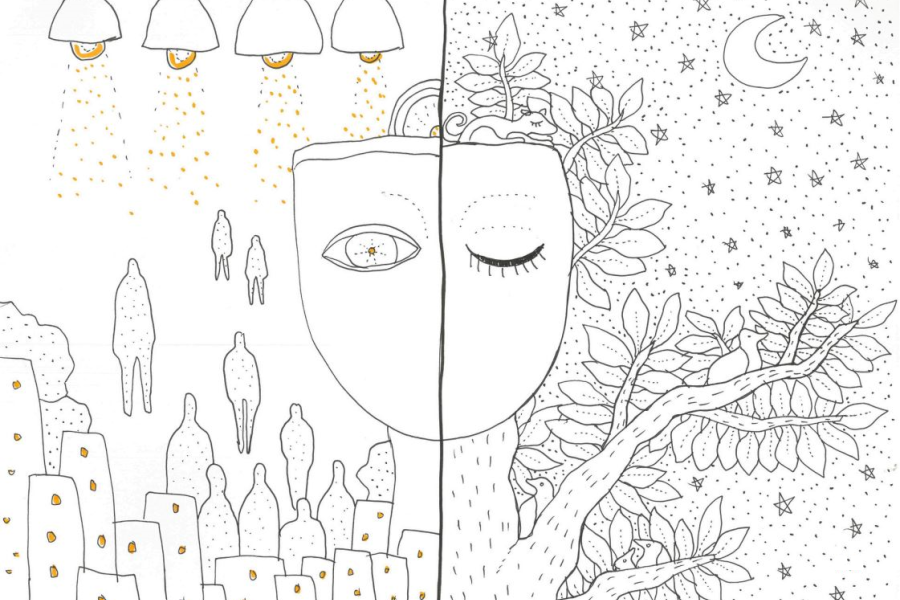The Importance of Darkness – Matariki and the Power of the Night

Illustration by Hyunh Kim, Australasian Dark Sky Association
This weekend, Aotearoa New Zealand celebrates the start of the new year: Matariki, a festival rooted in the Māori lunar calendar. Aotearoa is the Māori name for New Zealand, meaning “land of the long white cloud.” Matariki marks the reappearance of the Pleiades star cluster in the morning sky and is a time for reflection, remembrance, and setting new intentions.
Around this celebration, new research is calling for a renewed appreciation of something we often take for granted: the darkness of night.
Research by Dr. Ellen Cieraad (Nelson Marlborough Institute of Technology, affiliated with Leiden University and the BioClock Consortium) shows that New Zealanders not only value safety and lighting but also feel a deep connection to the natural night. In a national survey of 1,000 residents, nearly 80% said they believe it is important to protect the dark night sky.
“Darkness is not merely the absence of light – it’s a valuable resource that we are losing,” says Cieraad.


Sky photos by Phillip Cochrane
Darkness for people, nature, and planet
More than 97% of New Zealand’s population lives under a night sky affected by artificial light. Yet the research shows that people still value darkness—for several important reasons:
- their own health and sleep rhythms,
- the natural cycles of plants and animals,
- and the cultural significance of night, such as around Matariki.
Artificial light at night disrupts the behavior of nocturnal animals like bats, owls, insects, and amphibians. It can affect their orientation, foraging, and reproduction—impacting entire ecosystems. In addition, light also influences plants, for example by altering blooming or leaf fall. In short, darkness supports not only our biological clock, but also that of the natural world around us. However, when this ancient rhythm is disrupted on a large scale, both health and biodiversity come under pressure.
A smarter approach to light
The findings show strong public support for more thoughtful lighting policies: less focus on the idea that “more light is always better,” and more attention to the benefits of natural darkness. Many respondents favored lighting systems that adjust to context and use—such as lamps that switch on only when movement is detected.
Matariki is a moment to reflect on our place in the universe and our relationship with the natural world—including nature at night. There is much to gain, says Ellen, by making more room for darkness.
At BioClock, we emphasize the importance of such solutions—especially in the face of growing light pollution, climate change, and biodiversity loss. Using outdoor lighting more consciously is a simple but powerful way to protect ecosystems and promote health.
Join Ellen
Take part in a new project that is part of the global research initiative “Under One Sky: Exploring People’s Connection to the Natural World at Night.”
By taking just a few minutes to complete a short questionnaire, you’ll contribute to a better understanding of how people value and relate to the night sky.
📝 Share your experience via this link:
https://derby.qualtrics.com/jfe/form/SV_73ZNEotr7fWvncq
📄 Two scientific articles resulting from this research are currently under peer review, but already available as preprints:
1. Cieraad E, Dalley J. Bright needs, dark desires: Understanding public preferences for anthropogenic light and natural darkness at night in Aotearoa-New Zealand. Under review. Preprint available at: https://doi.org/10.5281/zenodo.15428871
2. Cieraad E, Dalley J. New Zealanders’ connection to the night sky. Under review. Preprint available at: https://doi.org/10.5281/zenodo.15678640


Tip: Matariki is also celebrated in the Netherlands!
This weekend, the Wereldmuseum Leiden is hosting a Matariki Festival featuring various activities focused on the stars, darkness, and Māori culture.

The BioClock Consortium is funded by the NWA-ORC programme of the Dutch Research Council (NWO; project number 1292.19.077).